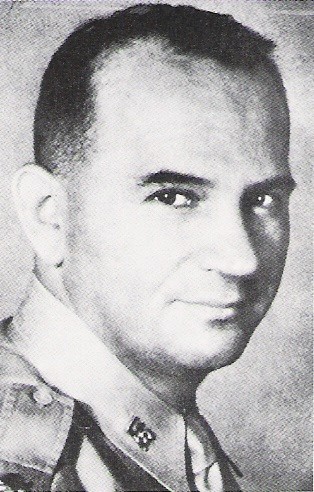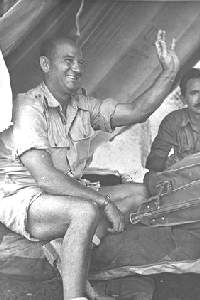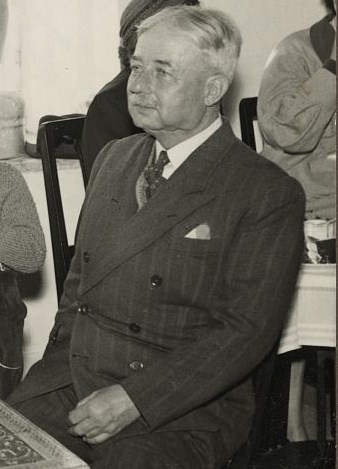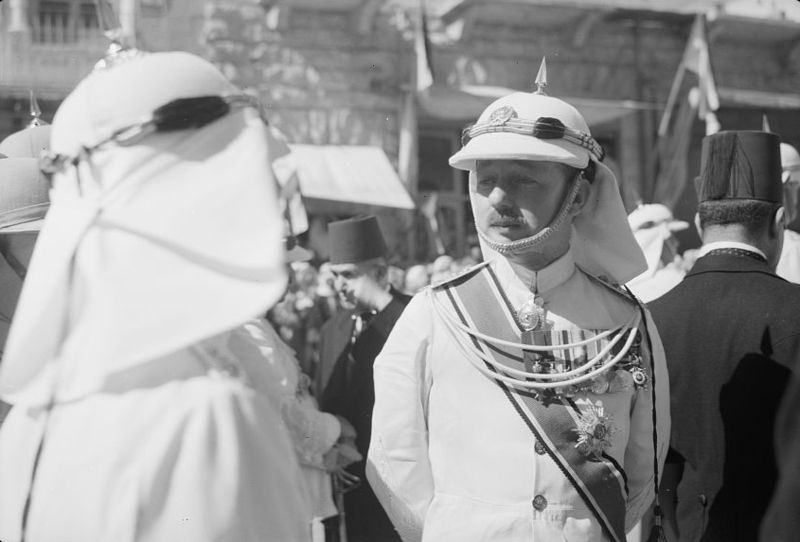<Back to Index>
- Aluf of the IDF David Daniel "Mickey" Marcus, 1901
- Lieutenant General of the British Army John Bagot Glubb, 1897
PAGE SPONSOR


David Daniel "Mickey" Marcus (22 February 1901–10 June 1948) was a United States Army colonel who assisted Israel during the 1948 Arab - Israeli War, and who became Israel's first modern general (Hebrew: Aluf). He was killed by friendly fire, when he was mistaken for an enemy infiltrator while returning to Israeli positions at night.
Marcus is the best known Israeli Machal soldier. He was portrayed in the 1966 Hollywood movie Cast a Giant Shadow that starred Kirk Douglas as Marcus.
Marcus's parents, Mordechai Marcus and Leah (née
Goldstein), came from Iași, Romania. Born on Hester Street on
Manhattan's Lower East Side, Marcus was bright and athletic. He attended
Boys' High School, in Brooklyn, and was then accepted at West Point in
1920 and graduated with the class of 1924. After completing his active
duty requirement, he attended Brooklyn Law School. He spent most of the
1930s as an Assistant United States Attorney in New York, prosecuting
gangsters such as Lucky Luciano. New York City Mayor Fiorello La Guardia
named Marcus Commissioner of the New York City Department of Correction
for the City of New York in 1940.
After leaving active duty, Marcus continued his Army service as a member of the Judge Advocate General's Corps in the Organized Reserve Corps. After the Japanese attack on Pearl Harbor, he was recalled to active duty. He served initially as executive officer to the military governor of Hawaii. He was assigned ultimately to Civil Affairs in Washington whose mission was to plan for the establishment of occupation governments after Axis occupied territories were liberated.
Marcus helped draw up the surrender terms for Italy and Germany and became part of the occupation government in Berlin after 1945. During that time, Marcus was placed in charge of planning how to sustain the starving millions in areas liberated by the Allies, and clearing out the Nazi concentration camps.
He was subsequently named chief of the War Crimes Division, planning legal and security procedures for the Nuremberg trials.
In 1947, David Ben Gurion asked Marcus to recruit an American officer to serve as military advisor to the nascent Jewish army, the Haganah. He could not recruit anyone suitable, so Marcus volunteered himself. In 1948, the United States War Department informally acquiesced to Marcus' undertaking, provided he disguised his name and rank to avoid problems with the British authorities of Mandate Palestine.
Under the nom de guerre "Michael Stone", he arrived in Palestine in January 1948, facing the Arab armies surrounding the soon - to - be declared State of Israel.
There, he designed a command and control structure for Israel, adapting his war experiences at the early Ranger school established in the Pacific theater to its special needs. He identified Israel's weakest points in the Negev south, and Jerusalem.
Marcus was appointed as Commander of the Jerusalem front on May 28, 1948, and given the rank of Aluf. (Prior to the 1967 Six Day War, "Aluf" was equivalent to a Brigadier General. In the present day IDF table of ranks, Aluf" is equivalent to major general.) As no ranks were granted to Israeli high command at that time, he became the first general in the fledgling nation's army (Israel Defense Forces).
He participated in planning Operation Bin Nun Bet and Operation Yoram
against the Latrun
fort held by the Transjordan Legion, which controlled the road and
prevented Israeli troops from supplying Jerusalem, which was under
siege.
While both attacks failed, Marcus helped plan and execute a makeshift
winding road through the difficult mountains to Jerusalem — known as the
"Burma Road" (named after the road built by 200,000 Chinese laborers
during the Second Sino - Japanese War that later served the Allies to
transport goods from Burma to China
during World War II). This allowed additional men and equipment in to
break the Arab siege just before the previously negotiated United
Nations cease fire took effect on June 11, 1948.
A few hours before the cease fire, Marcus returned to his Central Front headquarters. He and his commanders were billeted in the monks' quarters of the abandoned Monastere Notre Dame de la Nouvelle Alliance in Abu Ghosh. Shortly before 4:00 a.m., a sentry, Eliezer Linski, eighteen years old, and a one year Palmach veteran, challenged Marcus, who he saw as a figure in white. When Marcus failed to respond with the password, Linski fired in the air and the man ran towards the monastery. He fired at the man, as did one or more fighters in a nearby sentry post. Marcus was found dead, wrapped in a white blanket. As an American Jew, Marcus knew very little Hebrew and failed to understand the Hebrew challenge, and Linski did not understand Marcus who responded in English. Marcus wore no rank, although officers had been recognized by a ribbon pinned to their uniforms. As Marcus's body was removed from Abu Ghosh, a ribbon was found and placed on his casket.
His body was returned to the United States for burial, accompanied by Moshe Dayan and his wife Ruth, Yoseph Harel, and the wife of his aide de camp, Alex Broida.
Ben Gurion was suspicious of the initial report that Marcus had been shot accidentally. The Haganah was composed of several factions whose lack of consensus over strategy and tactics was one of the reasons for Marcus's appointment as commander for Jerusalem, and Ben Gurion suspected that elements in the Palmach may have conspired to kill Marcus so he would be replaced. On the same day Marcus was shot, Ben Gurion summoned Yaakov Shimshon Shapira - later Israel's Attorney General - and asked him to investigate the incident. Shapira's investigation was cursory. Despite conflicting reports concerning the number of shots fired, how many wounds Marcus suffered, whether the fatal wound could have been caused by Linski's rifle, and how and why Marcus may have been outside the monastery, he concluded that Linski shot Marcus in the line of duty. The report has never been made public.
His is the only grave in the West Point Cemetery at the United States Military Academy for an American killed fighting under the flag of another country. His gravestone at West Point reads: "Colonel David Marcus — a Soldier for All Humanity". A memorial plaque in his honor is located in the lobby of the Union Temple of Brooklyn where his funeral service was conducted. It reads "Killed in action in the hills of Zion while leading Israeli forces as their supreme commander in the struggle for Israel's freedom - Blessed is the match that is consumed in kindling flame/ Blessed is the flame that burns in the secret fastness of the heart/ Blessed is the heart with strength to stop its beating for honor's sake/ Blessed is the match that is consumed in kindling flame - Dedicated by his fellow members of Union Temple of Brooklyn December 9, 1949." Ben Gurion wrote to Marcus's wife Emma in Brooklyn, New York: "Marcus was the best man we had". On May 10, 1951, Ben Gurion laid a wreath at the Marcus grave, accompanied by Emma Marcus.
Kibbutz Mishmar David and the neighborhood of Neve David in Tel Aviv as well as numerous streets are named after him.
Colonel David Markus Memorial Playground, on the north side of Avenue P
between East 4th street and Ocean Parkway in Borough Park, Brooklyn, is
also named after him.


Lieutenant General Sir John Bagot Glubb KCB, CMG, DSO, OBE, MC better known as Glubb Pasha (born 16 April 1897, Preston, Lancashire – died 17 March 1986, Mayfield, Sussex), was a British soldier, scholar and author, best known for leading and training Transjordan's Arab Legion 1939 - 1956 as its commanding general. During the First World War, he served in France.
Educated at Cheltenham College, he was commissioned into the Royal Engineers in 1915. He was seriously wounded on the Western front, his jaw being shattered. In later years this would lead to the Arab nickname of abu Hunaik, meaning "of the little jaw". He was then transferred to Iraq in 1920, which was governed by Britain according to the League of Nations Mandate. He became an officer of the Arab Legion in 1930. The next year he formed the Desert Patrol — a force consisting exclusively of Bedouin — to curb the raiding problem that plagued the southern part of the country. Within a few years he had persuaded the Bedouin to abandon their habit of raiding neighboring tribes.
In 1939, Glubb succeeded Frederick G. Peake as the commander of the Arab Legion (Now known as Jordan Royal Army). During this period, he transformed the legion into the best trained force in the Arab world.
According to the Encyclopædia of the Orient:
- Glubb served his home country all through his years in the Middle East, making him immensely unpopular in the end. Arab nationalists believed that he had been the force behind pressure that made King Hussein I of Jordan join the Baghdad Pact. Glubb served different high positions in the Arab Legion, the army of Transjordan. During World War II he led attacks on Arab leaders in Iraq, as well as the Vichy regime which was present in Lebanon and Syria.
During the 1948 Arab – Israeli War the Arab Legion was considered the strongest Arab army involved in the war. Glubb led the Arab Legion across Jordan to occupy the West Bank. Despite some negotiation and understanding between the Jewish Agency and King Abdullah, severe fighting took place in Kfar Etzion, Jerusalem and Latrun. According to Avi Shlaim,
- Rumors that Abdullah was once again in contact with the Jewish leaders further damaged his standing in the Arab world. His many critics suggested that he was prepared to compromise the Arab claim to the whole of Palestine as long as he could acquire part of Palestine for himself. 'The internecine struggles of the Arabs,' reported Glubb, 'are more in the minds of Arab politicians than the struggle against the Jews. Azzam Pasha, the mufti and the Syrian government would sooner see the Jews get the whole of Palestine than that King Abdullah should benefit.'
- Glubb remained in charge of the defense of the West Bank following the armistice in March 1949, and as the commander of the Arab Legion until 1 March 1956, when he was dismissed by King Hussein who wanted to distance himself from the British and disprove the contention of Arab nationalists that Glubb was the actual ruler of Jordan. Differences between Glubb and Hussein had been apparent since 1952, especially over defense arrangements, the promotion of Arab officers and the funding of the Arab Legion. Despite his decommission, which was forced upon him by public opinion, he remained a close friend of the king. He spent the remainder of his life writing books and articles, mostly on the Middle East and his experiences with the Arabs.
In 1938, Glubb married Muriel Rosemary Forbes, the daughter of physician James Graham Forbes. The couple had a son, Godfrey (named after the Crusader king Godfrey of Bouillon) born in Jerusalem in 1939, and adopted a Bedouin girl in 1944 and another daughter and son, his daughter from Palestinian refugees and son (named before atalla) from Jordanian bedouin in 1947.
Sir John died in 1986 at his home in Mayfield, East Sussex, and is buried in the graveyard at St. Dunstan's Church in the village. King Hussein gave the eulogy at the service of thanksgiving for Glubb's life, held in Westminster Abbey on 17th April 1986. Lady Glubb died in September 2005 and is interred with her husband. Their son, Godfrey, converted to Islam as a young man and took the name of Faris, becoming a prominent journalist and researcher into the Palestinian cause. He was killed in an accident in Kuwait in April 2004. Daughter Naomi died in July 2010.